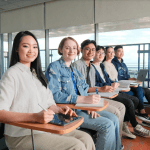03 Jul 2022
Constructivism Learning Theory in the Field of Education
Articles,

The latest slogan in education is “constructivism,” applied both to learning theory and to epistemology, which is how people learn, and the nature of knowledge. We do not need to give up every time there is a new method, but we need to think about continuation in relation to learning theory and knowledge in constructivism learning theory.
What is Constructivism Learning Theory?
Constructivism is a philosophical learning theory that develops students’ logical and analytical abilities based on their experiences and their surrounding environment. The basis of this theory is that the real-life experiences of an individual play an important role in their educational process.
Constructivism emphasizes the fact that experience is the main source of knowledge in people’s lives. Constructivism is a learning theory which holds that the mental abilities and activities of individuals help in building their knowledge base.
Constructivism learning theory is about building perspectives about things and constructing meaning based on our experiences. The constructivist approach is strongly influenced by a person’s age and mental abilities, and may not always be accurate. But as one develops, things become more complicated and realistic.
Some of the main driving elements or principles about constructivism are:
- Having prior knowledge before attending formal training, has an impact or relevance to the learning procedure.
- Knowledge is influenced by our environment and that influence may not conform to global standards. For sufficient knowledge, a person needs to apply their efforts and actively participate in activities gaining experience.
- Knowledge is built through experience which cannot be transferred.
The Influence of Constructivism in the Learning Process

In the process of teaching and education, constructivism theory can be a very profitable business. In a brief approach, constructivism can be adopted as a substitute for textbook learning.
Students are encouraged to utilize their thinking, reasoning, and analytical skills. At the same time, education is becoming more about applying concepts and building connections rather than retrieving information.
For teachers and educators, the teaching and learning process has become more centered on the practical application of concepts. Students learn from a hands-on approach to things and interpret the results according to their perspective. This process involves a lot of discussions and inquiry-based learning so that students respond more actively.
In terms of the assessment procedure also changed, because teachers do not have to assess students according to traditional assessments. Students themselves analyze their experiences, and assessment is also involved as a learning process.
Types of Constructivism Learning Theory
4 types are studied in the world of education and also in general, namely:
Trivial Constructivism (Simple or not very detailed)
Is one of the most basic and simplest forms of constructivism. This type can be considered the basis of all other constructivist theories. In this case, knowledge is constructed by the learner through the interpretation of personal experience based on his cognitive and mental abilities. This is not only induced from the environment automatically but also requires active involvement.
Radical Constructivism
Radical constructivism places more emphasis on the construction of knowledge and argues that textbook knowledge is not very meaningful. This type can be related to the methodology of mathematical work but is difficult to understand and apply.
Social Constructivism
Peers and society greatly affect the experience and learning process of an individual. The teacher’s family, friends, administrators, and peers directly influence a student in various activities in the classroom. Even outside of school, this influence is quite significant. Therefore, social constructivism is also an essential type of constructivism.
Cultural Constructivism
The culture and traditions of a place also affect the perfection and one’s opinion about something. By observing a person’s cultural background, we can find out the factors that influence their perception.
Some Common Beliefs About Constructivism
- Constructivism learning refers to finding the meaning behind concepts. Therefore, it must be influenced by the individual’s daily life experiences and the surrounding atmosphere.
- Application-based learning is more important than knowledge just from reading books. Education must be given in context with practical learning and understanding of the ideas behind theoretical concepts.
- To ensure proficient and productive teaching practice, a teacher must be able to analyze students’ thinking abilities first. Their thinking procedures and assumptions must also be taken into account.
- Instead of accessing and forcing an answer to a problem, students must be able to analyze the conclusion of the problem based on their point of view. This process develops student engagement and also ensures a better understanding of the concepts involved in the teaching scenario.
- When a student joins an International or multicultural school or any other kind of formal training, he or she already has a view of the world through constructivism.
- A student can then develop their perception based on the knowledge given in class and relate it to their experience.
- New ideas can be built because students have a good set of logical and reasoning skills. Students can also apply concepts and convey them in a better way through a practical learning approach, and this lead to a better understanding.
Thus the discussion related to constructivism learning theory in the field of education. Find other interesting lessons only at Sampoerna University. For more information about the Education Program at Sampoerna University as well as scholarship information, please contact the following link.
Reference





